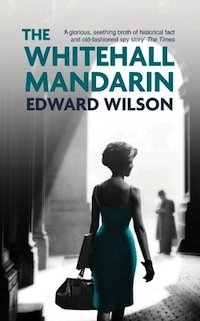For crime readers with a penchant for espionage, there’s a select band of authors to explore ranging from young turks Charles Cumming and Chris Morgan Jones to veterans John le Carré, Alan Furst and Charles McCarry. Within a few pages of Edward Wilson’s latest Cold War novel, you’ll realise he’s one of the old guard. A Vietnam veteran, Wilson lived through these times and it shows in his pungent prose and sense of history.
This heavyweight thriller never reads like the author has simply taken a certain amount of research and weaved it around a suitably shadowy plot. Having lived in the UK since 1974 (he later renounced his US citizenship), Wilson knows all the nooks and crannies of modern British history, particularly the scandals that came to light involving Soviet infiltration.
The Whitehall Mandarin is the latest book in the Catesby spy series. You don’t need to have read the earlier titles although it will give you a greater sense of this anti-establishment character. William Catesby remains a bit of a mystery in this novel: we learn more about his left-wing politics than his love life. If the British spy is rather monkish, the same can’t be said for other characters in the book, which reflects the sexual escapades among the upper classes in the swinging 60s.
The Whitehall Mandarin of the title is Lady Somers, a single parent and the first woman civil servant to take charge of the Ministry of Defence. However, there’s a whiff of corruption surrounding this rich and powerful official, who may be the woman featured in the missing part of an erotic group photograph that’s been passed to Catesby. It could be just another sex scandal – or maybe she’s sided with the Russians. Meanwhile, her daughter, Miranda, is developing a drug habit and getting involved in radical politics.
Catesby is ultimately tasked with investigating the case and then covering it up, although this novel is set on a much bigger scale than a scandal at the heart of the British establishment. Wilson is audacious enough to portray historical figures including Chairman Mao, President Nixon and even the Queen. He brings a keen psychological insight to political leaders as well as intriguing real-life characters such as Soviet spy Sir Anthony Blunt and Paul Tibbets, the US pilot who dropped the atomic bomb on Hiroshima.
History and fiction are seamlessly combined in a novel of double agents, tradecraft and political paranoia that spans the 1950s and 1960s and locations including London, Lowestoft, Moscow and Hanoi. Wilson also captures the rivalry between those who should be on the same side. MI5 and MI6 are regularly involved in turf wars, while the struggle between Soviet and Chinese communism is at the heart of the book.
However, The Whitehall Mandarin is not just an elaborate history lesson (fascinating though it is). Wilson also shows a sure touch when it comes to thrilling action sequences, including a peerless escape scene that starts with an agent turning the tables on his US captors who are about to dose him with LSD.
There’s also a wonderfully antagonistic relationship between Catesby and Jeffers Cauldwell, a wealthy dandy from the American South who makes for an unlikely Soviet spy. Cauldwell, who is officially employed as cultural attaché to the US embassy in London, relishes stirring up trouble in international affairs.
As well as the paranoia that infuses this plot – nobody appears to be able to trust anyone – there’s a sense of anger from the author as he writes about the greed and false promises of intelligence agencies, particularly during the Vietnam War. However, there’s humour too, including a running joke about Catesby’s ancestor being a leader of the treacherous Gunpowder Plot of 1605.
Adroitly plotted and written with sharp, elegant prose, The Whitehall Mandarin is a well-rounded novel and first-rate espionage thriller that spurns conspiracy theories in favour of a long, hard look at the state of the post-war world. Wilson takes you on an exhilarating ride through the Cold War. Like le Carré, he also confronts you with the shocking abuses of power that have taken place on all sides.
Read our feature on John le Carré’s debut Call For the Dead.
Arcadia Books
Print/Kindle/iBook
£7.19
CFL Rating: 5 Stars











Puzzling that when Cauldwell wants to use the phone box in Southwold, there is someone ahead of him who has lined up ‘tuppences’ to feed into the payphone. In 1957. Also some of the slangy speech the Brits use sounds a bit too modern for that year.
Also the author thinks that ‘D-Notices’ were issued by the government to police forces to stop them investigating matters deemed to be linked to national security (rather than newspaper editors)
Thinks 55 Broadway was the HQ of ‘London Underground’, and not London Transport (buses, underground, trolleybuses).